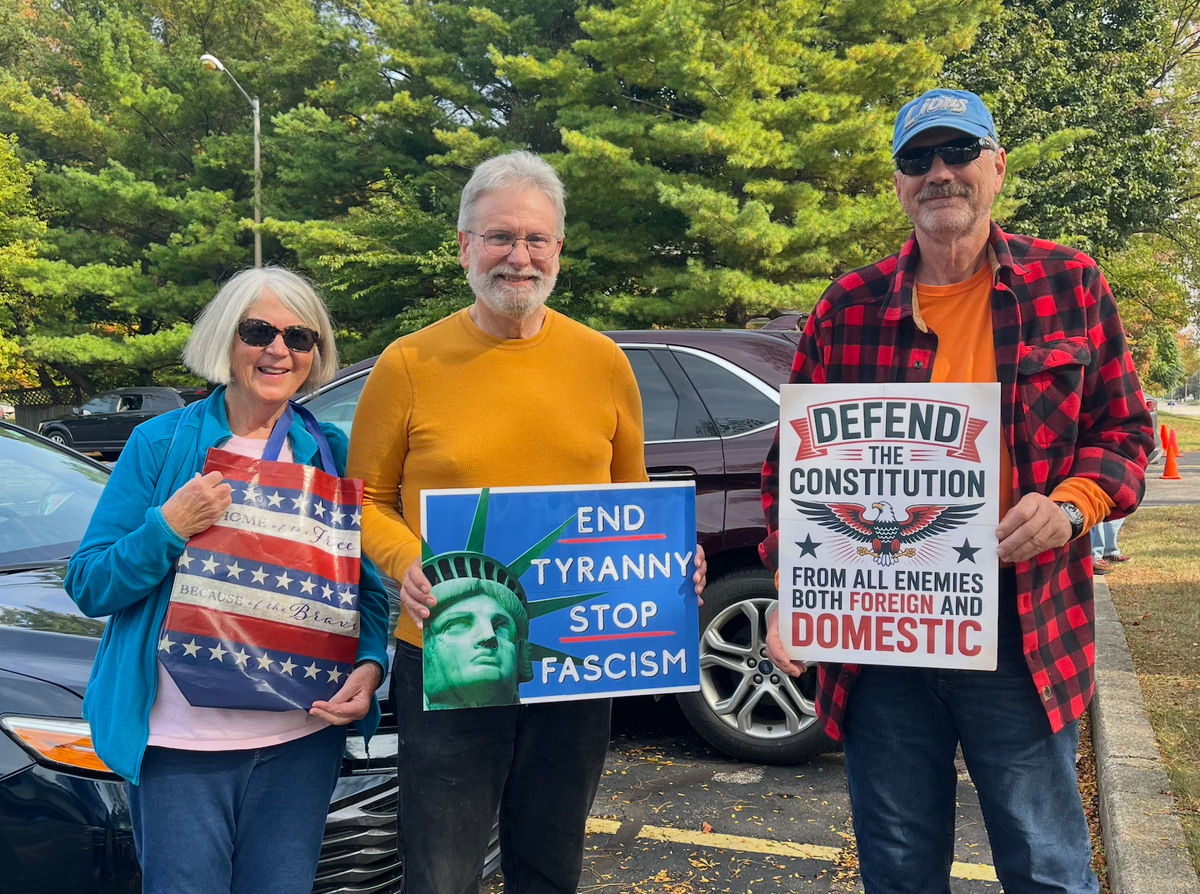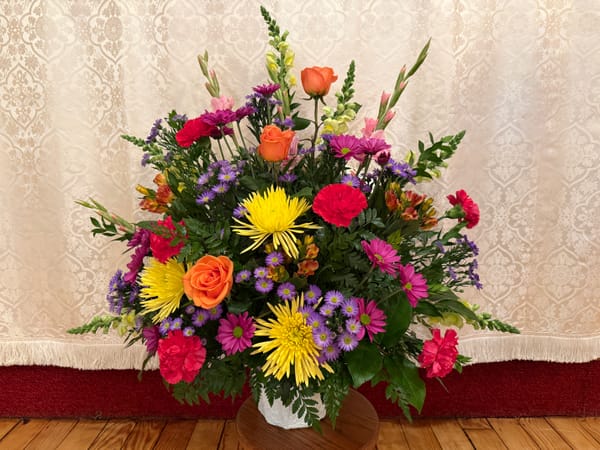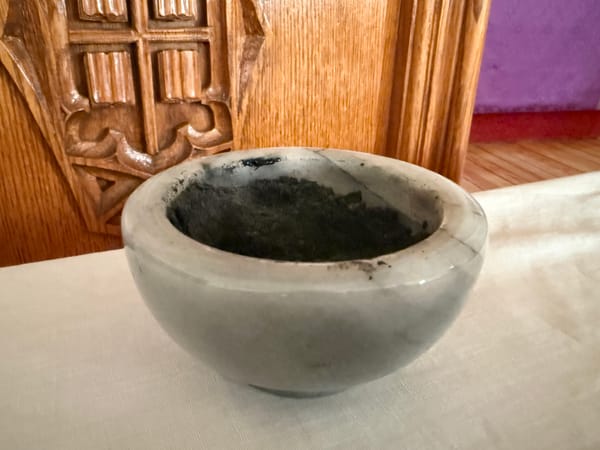Persistence in Protest, Prayer, and Patience
A life of prayer will ground us in a faith and in a relationship with God that will form us into a people best equipped to change the world around us.

Pentecost 19, Year C, Proper 24
Sermon for October 19, 2025
My friends, I speak to you today in the name of one God, Father, Son, and Holy Spirit. Amen. Please be seated.
Good morning, Epiphany. Happy rainy Sunday morning. We haven’t had one of these on a Sunday in a while; it was a mostly dry summer here in South Haven. I had a cup of coffee and sat on our porch for a bit this morning, taking it in before service. It’s kind of nice, as long as you have a roof over your head and a hot cup of something to drink. Winter is coming soon too, isn’t it? Well, thankfully, yesterday stayed mostly dry, after a brief shower in the morning delayed Jane Wakefield’s last soccer game of the season.
It’s nice that it stayed dry because, of course, it was a big day here in town, and all around the country. Americans gathered by the millions to celebrate the Church of the Epiphany’s 123rd birthday... ground was broken for this church in this place 123 years ago yesterday, October 18, 1902. So, happy birthday, Epiphany. Maybe that’s not why people gathered.
Many of you were out on the streets of South Haven yesterday for the No Kings Protest, joining a reported 7 million of our fellow Americans in loudly proclaiming the rule of law, the Constitution, they are not optional for anyone in our country; the checks and balances of a three-branch system of government, they are not optional here. People took to the streets in large urban centers specifically to protest against ICE’s presence there and against the federal government’s treatment of those who might look different from those in power, something I preached about here last week, our need to learn from the foreigner and not see anyone different from us as a threat. My dad was even out there holding a sign that said, “End tyranny, stop fascism.” Antifa Ken, as we call him.
Well, this week in the gospel, as we continue in Luke’s narrative, with Jesus on his way to Jerusalem, we find another example of someone on the fringes of society, another with very little power or agency. Widows, throughout the writings of the Old Testament, stand as reminders for all the powerless, often paired with orphans, but in a patriarchal society in particular, a widow is about as low as you can get... in Jewish society, when women married, they fully left their old families behind to make new ones with their husband. After the husband’s death, they truly have no one, no one left to advocate for them, no one left to earn a living, no one to care for their needs. They were wholly dependent on the political and religious systems in place, dependent on the kindness and faithfulness of others. (We have far too many like them today, in the wealthiest nation in the history of humanity.)
These were not always elderly women either. When we read the Bible, we’re talking about the first century, when average lifespans were 30-40 years... some may live into their 60s or 70s, yes, but that was far less likely than it is today. Widows in Jesus’ time easily could have been 20, 30, years old, wholly dependent on those around them.
Today, then, we have the story of a broken system of government when it comes to the marginalized, we have the story of a judge described this morning as having no fear of God or respect for people. Given the context of yesterday’s protest and the political leanings of many in this room, I know there are many here who immediately identify with and appreciate this passage of scripture. (Ha.) Twice this week, as we read the lectionary in community here at Epiphany, there were audible laughs as we read about this unjust judge. I get it. There were laughs too when we read 2 Timothy, when we read about those who would “not put up with sound doctrine, but having itching ears, will accumulate for themselves teachers to suit their own desires, and will turn away from listening to the truth and wander away to myths."
Both the 2 Timothy reading and today’s Luke reading may appear to be pretty straightforward condemnations of other people in American society in 2025, but certainly not of us. This may be a good moment, especially as someone who grew up very much on the other side of the political aisle in the church, to remind everyone that seeing the faults of others in scripture and never our own, well, that is a very dangerous path for anyone to tread. Specks and planks in eyes, and all that.
What I did not hear much personal identification with this week was our Old Testament reading, from Genesis 32; it seems it is more difficult for us to see ourselves or others in the story of Jacob wrestling with God or with an angel representing God, than it is in the stories of the unjust judge and the wandering believers. Similar to the creation story and the story of Noah and the flood, we cannot know if this story literally happened this way or if it is simply a founding myth for the Jewish people. We cannot know if God really did dislocate Jacob’s hip and then concede a wrestling match, but that matters little today. The lesson for us from our Genesis reading this morning is that of wrestling with God, of being persistent, “not letting go until God blesses us.” This is what the widow is likewise acclaimed for, centuries later, of not letting go, of knowing what is right and just and doggedly pursuing it to the point where even an unjust judge decides to finally relent.
For us, this morning, then, this Luke reading is a parable about persistence. I want to affirm for us this morning that, yes, this is a parable about persistence in the pursuit of justice under the rule of a judge with little care for the opinions of God or the people around him, yes. This is about persistence in protest. We are to stubbornly pursue justice, just as the powerless widow does in the face of overwhelming odds and little apparent hope. But when seen in the light of Jacob wrestling with God, when seen in the light of Luke’s framing in the first sentence, this is also very clearly a parable “about the need to pray always and not to lose heart.” This is a parable about persistence in prayer too.
Now, we don’t believe in a prosperity gospel here, we don’t believe that if we just pray consistently, we will get that yacht, that private jet, so this could be relatively rocky terrain we’re about to enter if we're not careful. Remember that the text does not say that the widow kept coming to the judge and saying, “Grant me a million dollars and the nicest house in town,” and the judge finally gave in. Instead, of course, the widow asks for justice, and eventually, this unjust judge relents. So, then, to echo a few of Jesus’s other parables, how much more will a kind and loving God respond to the prayers of God’s people, if we steadfastly, persistently ask God for justice? If we ask God for peace, for joy, for healing, for reconciliation, for contentment, for all good things?
Friends, this morning, I am confident and thankful that this group gathered here will be persistent in protest. We are not disengaged from the world around us. We do not ignore the needs of the widow and the orphan, the foreigner and the oppressed. But I also ask as your priest that we also be equally persistent in prayer. These must not be two different things, held in two different hands. Martin Luther King, Jr., Desmond Tutu, Dorothy Day, Oscar Romero, and countless others have found that a life of prayer will best empower us, inspire us, ground us in a faith and in a relationship with God that will then form us into a people most capable and best equipped to change the world around us. Prayer forms us. It may indeed change God; though the readings today say that it can, there’s little way of knowing that for sure. But prayer certainly changes us. That is undeniable.
Thankfully, our God is not an unjust judge. God is one worthy to be wrestled with, to approach, to commune with in prayer. We may not see the results of those prayers in our own timeframes; Abraham died before he saw the promises of God fulfilled, but his grandson Jacob continued to wrestle, and from his line came Jesus, the Son of God born into the world to save us, to lead us toward God’s upside-down kingdom where the first is last and the last is first, where the hungry are fed and the poor inherit all. This morning, may we continue to protest and pursue justice for all those without it, may we continue to pray and not lose heart, and may we be ever patient, knowing our God is listening, our God is good, and our God will grant justice to those who cry to him day and night.
In answer to the final question of the Gospel reading today, when the Son of Man comes, may he find the Church of the Epiphany protesting and praying and patiently waiting. May he find faith here in this place, on Kalamazoo and Erie, more than 123 years after the first stone here was laid.
Amen.




